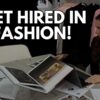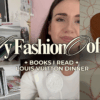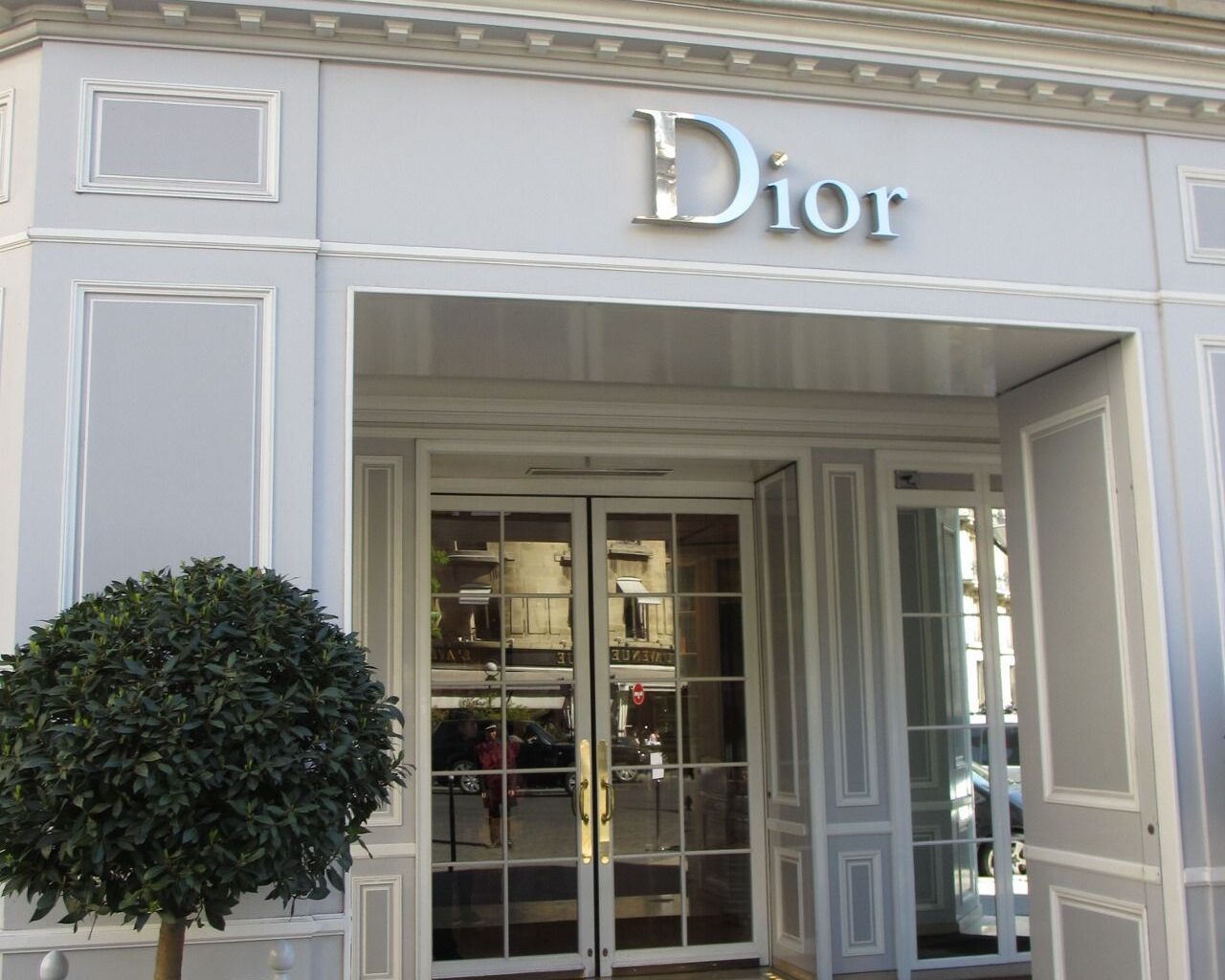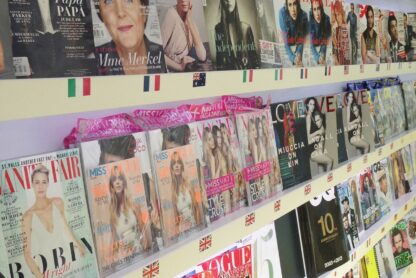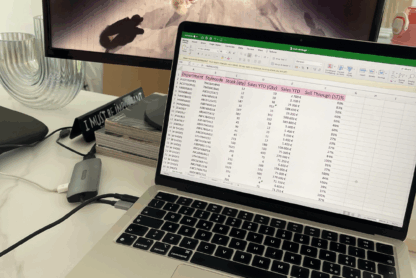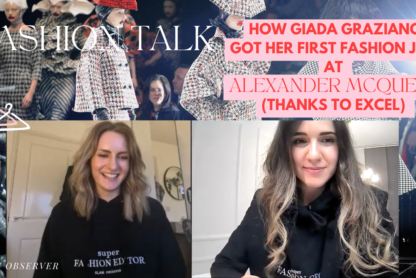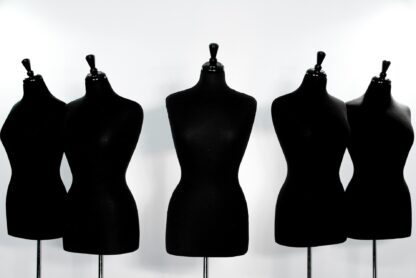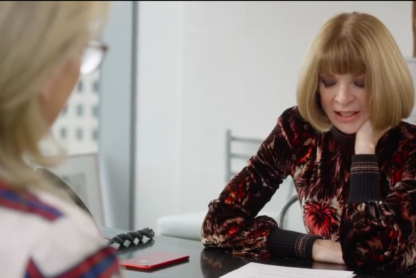Is it your dream to work in the luxury fashion industry? Have you ever been left wondering how to even start or enter the luxury market? This week Giada Graziano sat down and interviewed Kiana Brooks. Who is currently an associate buyer for women’s ready-to-wear and shoes in the luxury fashion industry, having previously worked for Gucci, Prada, and Saint Laurent.
I attended the call, with many other Break Into The Fashion industry students to see what Kiana had to share about her incredible journey into luxury fashion in New York. Joining the zoom call, Kiana was confident and projected such a warm, kind, positive energy across the community. With a soft-hearted smile, she began to tell us her uplifting and impactful story with her unique voice.
This article is also available as a podcast on Spotify and Apple where you can listen now.
Let’s go back to the beginning, tell us what you studied and how you broke into the fashion industry?
I studied at the Fashion Institute of Technology here in New York, but I am originally from Atlanta, Georgia. I always knew I wanted to work in fashion, ever since I was young I would play dress up in my older sister’s clothes, or go into the mall and run into the luxury stores. I was always so involved in fashion and I just didn’t know what a career would look like. So I started reading and doing a lot of research and I ended up finding in a teen vogue book about fashion careers and I came across buying. It felt like a perfect fit for me because I have a super analytical mindset and I knew I wanted to be around creativity and around the product.
So I found the Fashion Institute of Technology and decided that’s where I wanted to go. When it came time to apply, I ended up getting in and I just made up my mind; I wanted to move to New York and study fashion. Long story short; I interned a bunch and ended up graduating and working at Gucci as an Assistant Buyer for men’s ready-to-wear.
While you studied you already started your first fashion internships. How did you manage organizing your classes and studying while interning?
It was definitely more challenging than other college experiences that are a lot more flexible, going to FIT was very demanding in terms of balancing internships and school. I was able to take my classes 2-3 days a week and intern the other full days. I really recommend this as a lot of people will do half days at school and then intern in the afternoon or vice versa. But I really recommend trying to get at least one full day in at your internship, because you get to see the workflow from start to finish and it’s really like your an employee.
So that’s what I did, I interned around 2-3 days a week, and it really was like I had a part-time job I was able to be an important role on these teams and I think that played into securing my jobs after college. To the point of how I managed my time; it was really about how I managed my priorities and what I was able to focus on. I was very fortunate that my internship could sustain my living needs, I didn’t need to work another job. Don’t get defeated if you can’t find the time to intern during school you can always do it during the summer breaks or after you graduate.
Since you already had knew you wanted to go into Buying, did you look directly for this kind of internship? I noticed you have previous experience in product development.
I would definitely say do not limit where you apply based on the job title! I applied everywhere, it could have been for anything and I was like I will do that, I will figure it out. Especially when it comes to luxury companies a lot of times they don’t list all of their roles, it’s really just about getting your foot in the door then pitching yourself once you have an interview. My internship at Marc Jacobs was my first brand internship. I had interned at a small e-commerce company before that and I knew I wanted to get into a bigger company and so I cold emailed. Meaning I emailed without having any contact information. I just started guessing what their email might be, one of them was right! I sent my resume and my cover letter in the body of the email. Someone got back to me, it was the craziest thing! They told me they were interviewing for a production internship and I didn’t know anything about production, I didn’t even know what she meant by that. She also says please bring your portfolio, not only do I not have a portfolio, but my skill set is really not tied to any sort of portfolio design. So I was super stressed, but that didn’t stop me from going to the interview.
I brought a little folder of some case studies I had done on business profiles in school and she was super impressed! She said she really liked my experience and Excel use and everything I knew. She told me about the position, it was totally outside of what I thought I wanted to do, it was for sample production for furs and I ended up loving that internship so much. I got to go to all the fur fabrics and garment districts, I was steaming samples and buying fabrics. All stuff that has nothing to do with buying per say but all helped me to get into Marc Jacobs. Which is a luxury brand, that helped me get the row, Prada, Saint Laurent. Just because I had this luxury brand on my resume, people didn’t really care that it was production. I enjoyed the experience and I would definitely advise you not to limit yourself to a role, especially at the beginning of your career, and focus on the company that has values you agree with.
Do you think it is important to focus on the kind of company you apply to? If someone wanted to go into luxury fashion, should they only go for luxury brands?
I would definitely say the luxury industry can be a little snobby when it comes to hiring people who have luxury brand experience. But at the end of the day, you have to land your first luxury job somehow and they aren’t going to hire you without any experience, just because you’ve never had luxury experience. You’re going to have to come to the table with something and I think from what I learned about breaking into the luxury industry, is your ability to speak to the quality of the product and your love for the designs themselves. Because that’s really what it comes down to, is taste and that’s what luxury brands fear in hiring someone who has no experience at a luxury brand.
They fear that that person is going to come into the brand and start suggesting that they look to Zara or to Michael Kors or something lower tier. Once you get into that luxury brand interview it’s so important to speak about how you love Haute couture shows and how you have done your own research on forecasting for these brands. Anything you can do to elevate yourself and their perception of you is how you can get around not having a luxury experience.
I love how you spoke about not having a creative portfolio, yet you found something to bring to the table for that first internship and you didn’t give up or feel intimidated. It is true that these luxury fashion companies prefer to see your skills!
Definitely! They really just want to see that you care, I know it sounds cliche but they are looking for effort, they’re looking for something that stands out. Don’t ever show up anywhere empty-handed. If your interview is in person, some things that I have found are having a very sleek folder for your papers or resume or always bringing a pen, just increase your effort as much as possible.
Let’s move to the present; tell us about your role as a buyer at a luxury fashion brand, what are your responsibilities in a normal work day?
As of right now, I am in women’s ready-to-wear and shoes and I focus mostly on ready-to-wear as it is a bigger business. So on a weekly basis, I can tell you… Monday is focused on key reporting, it’s all about looking at how we did the previous week. We look at important KPI’S like sell-through a lot, especially in ready-to-wear as it’s all about sizing and how many units we have on hand versus how many we bought. It comes down to profitability at the end of the day. We also look at Average Unit Retail, which is the average price of what’s sold, so looking at that is really important to make sure we’re selling quality items. If it’s really high one week, maybe we sold a lot of gowns or a fur. You are trying to beat the year previously each day.
So, what skills are required for a job like yours?
Definitely Excel! I pride myself on my Excel skills. It’s really worth investing in learning excel on a deeper level, I learned it at college. If you can take it at school definitely do, if not it is something you should definitely invest in. It’s not something that is easy to learn on the job. I personally hate teaching people Excel on the job. You can be taught on the job but it is definitely a burden, it takes away from other things you could be learning. If I have to teach an intern how to do a V Lookup Table, that a half-hour I could have been teaching them how to choose an assortment or analyze a runway show.
If you can invest in taking an actual course and learn, then do! Excel is one thing, for buying I would also say being stylish and having a voice and being able to analyze trends is really important. So that is the creative aspect, we do work in fashion for a reason. If they wanted computers to do our job, they would figure it out. But they want people who have a voice and offer ideas that are creative and fresh. So have a creative mindset but a business analytical component is really important.
How long after your analysis do you propose adjustments to strategies?
Immediately! So, it’s a seamless process, so we run the reports as a team ad as soon as they are run, we need to analyze them to see how we did and how business is. That week we then start looking at action plans it can even be the same day. If I see one store had a really bad week, I will consolidate or move product out of that store immediately. But it could also be an action plan such as; we saw this one store has been doing bad for several weeks, maybe we can partner with visual merchandising to get them a special installation, this would be a more long term project.
Do you work in a specific location?
So we are all of the USA, and Canada and South America including Brazil and Mexico, so we have a very big region with almost 50 stores now that we manage.
So Mondays are for analyzing and KPI’s, what are your other duties throughout the week?
Mondays are specifically all day spent on analyzing, but we still do this every morning. Then I would say the rest of the week is spent making the action plans and executing them. Whether it’s partnering with visual merchandising or the training teams to train the retail stores on products, so maybe we will give them a key selling focus. It’s a lot of so how can we drive business? That’s a typical week, but then there is market that happens 4 times a year and these are the peak times where our week is full of chaos and riven by seeing the collection and buying the collections.
Do you attend the fashion shows?
So this is a big misconception of being a buyer. We don’t really attend the fashion show unless you are at a very senior level like the senior vice presidents. Occasionally the team will get to go to a show that’s local, so if they had a show in New York we would get to go or if we happened to be in Paris at Market we would get to go. Usually budgeting constraints buyers from going to the show, mostly the PR teams gets to go to the show as they’re dealing with the clients But were very internal, so what actually happens is you have an internal fashion show for the buyers and merchandisers which happens about a week after the public show in the HQ for the brand. So at Gucci for example our global HQ was in Milan, and so when we would go to Milan, all the region buyers would be there.
What is it like to work in a New York City office for these European Brands?
So working in New York is interesting because anytime you work for a European brand, not in Europe, so anywhere in the world that’s not France, Italy or even the UK, you are in a satellite office which means your not the global HQ so your managing only a specific region. It’s interesting because you’re not reporting to the global HQ team but their job is to manage all of the satellite offices. So it’s just a different role, but I think it’s nice as the whole point of having these offices is because the teams there are better and more knowledgeable about their region.
So if I were to buy for china for example I would be horrible at that because I know nothing about the Chinese target market, I wouldn’t know which store does better with what. Whereas my job in the US is to know my market, so I travel to the stores, I know whats the difference is between Texas and Florida, that’s my job is to know my region. So the global HQ touches base with each of these regions and gathers feedback to create a cohesive message and make sure they build a collection that works to the best advantage of all of the regions. But our job in a satellite office is to be more focused and represent our region, whether that be trends, products, or fit needs. It’s a very important team effort.
How are you managing your role after the pandemic, has it changed?
It’s so different in the worst way. But there are some advantages, lie I’m in my apartment right now versus at an actual office. But overall I would say the main change is travel, unfortunately, we haven’t been able to travel in almost 2 years now, we’ve gone through phases of starting to travel again then stopping. One of my favourite parts about being a buyer is getting to travel, not even just to Paris or Milan but domestically to our stores in our region to understand the market. In terms of the actual role itself it’s become a lot more adaptive and a lot more driven by commerce, we’ve become a lot more think on our feet to problem solve. As a retail business, we have one e-commerce website, which is just one store when you think about it, so when all our stores were closed in the pandemic, we had to think on our feet, shift units to e-commerce and mail products to clients and focus more on clientele to still end the year on a high.
What do you like most about your job?
As much as the day to day can be a little mundane sometimes, my favourite part of the job is when I get to interact with the product itself, when we get to go to market and see the product in person and help develop the product in a way, as we get to step in and notice things for our client; can we develop this print on that coat or lower that v neck. I love luxury because the product we are working with is really cool. You should always focus your efforts on what you actually love, if you are really into streetwear, don’t waste your time trying to work at Chanel, go intern at Yeezy, because what your gonna love the most is the product of where your work.
What are the top lessons you have learned so far? What would you tell your younger self?
What I would tell my younger self who wanted to get into fashion. I am a black woman working in the luxury fashion industry, which does present its own challenges especially here in America and even more so abroad. When we travel to Europe there is even less diversity. I think as a child it didn’t cross my mind, but as I continued working in this industry a lot of time it can be disheartening or defeating. I wish I could go back and tell myself, you’ve got this, don’t be disheartened, even if you don’t see the representation, you can be the representation. I would encourage you all to be a positive voice for people in this industry, I always try to reach back and encourage people to never shy away from their voice, and remember what made you want to work in this industry in the first place. We need more creative and unique voice in this industry.
Enrolment for this new Excel for fashion course is open now! Currently at a super discounted price, but be quick enrolment closes this SUNDAY 6th February at 12pm CET.
We also have a LIVE FREE FASHION PANEL this Thursday with Buyers and Merchandisers on how to get a job in fashion, thanks to Excel. You can register now HERE Thursday 4th February 7pm CET.
